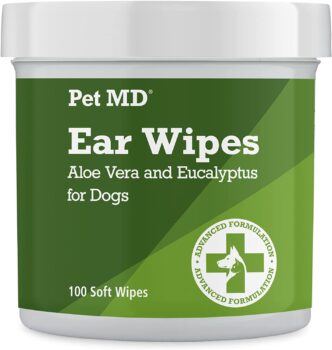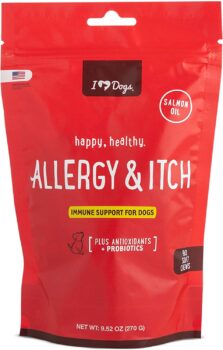Ear infections are common in German Shepherds due to their upright, deep-set ears. These infections, if left untreated, can lead to severe complications, including hearing loss. This comprehensive guide will discuss eleven effective ways to treat and prevent ear infections in your German Shepherd, with particular emphasis on the power of Omega-3 in fighting allergies.

iHeartDogs is reader supported. Some of the links below may be paid affiliate links, where we receive a small commission on a product at no additional cost to you.
1. Regular Cleaning
Ear hygiene is crucial in preventing infections. Use a vet-approved ear cleaner and gently wipe the outer part of your dog’s ear with a soft cloth or cotton ball. Do not insert any object into the ear canal, as it may cause harm. Regular cleaning helps to eliminate wax buildup and bacteria.
Our favorite ear cleaner is these PetMD brand ear wipes on Amazon.
2. Proper Diet
A balanced diet plays a significant role in your dog’s overall health and resistance against infections. German Shepherds are prone to food allergies, which can lead to ear infections. Omega-3 fatty acids, present in fish oil and flaxseeds, have powerful anti-inflammatory properties that can help combat these allergies.
3. Omega-3 Supplementation
To further leverage the power of Omega-3, consider adding an Omega-3 supplement to your dog’s diet. These supplements can boost your dog’s immune system, reduce inflammation caused by allergies, and ultimately aid in preventing ear infections.
We’re fans of this Norwegian salmon oil on Amazon. It’s a bright orangish-pink color and has no fishy smell at all due to it’s ultra high purity.
4. Dry Ears After Water Exposure
Water inside your dog’s ears can create a breeding ground for bacteria. Ensure your German Shepherd’s ears are thoroughly dried after bathing, swimming, or any activity involving water exposure.
5. Regular Vet Check-ups
Routine veterinary check-ups allow for early detection and treatment of potential ear infections. Your vet will look for signs of redness, swelling, or discharge in the ear canal and may perform tests to confirm the diagnosis.
6. Prompt Treatment
If an ear infection is suspected, early treatment is essential to prevent complications. Depending on the type of infection, treatments may include antibiotics, antifungal medications, or corticosteroids.
7. Allergy Management
Managing allergies effectively can help prevent ear infections. If your dog is allergic to certain substances or food, work with your vet to identify and eliminate these from your dog’s environment or diet.
A few good supplements to help your dog’s allergies are apple cider vinegar, quercetin, and colostrum, all of which are found in many natural allergy supplements like this one.
8. Parasite Control
Parasites such as ear mites can lead to ear infections. Regular use of a vet-prescribed parasite control product can help keep these pests at bay.
9. Avoidance of Irritants
Smoke, dust, and certain cleaning products can irritate your dog’s ears and potentially lead to infections. Keep your dog’s environment clean and free from these irritants.
10. Healthy Weight Management
Overweight dogs may have weaker immune systems, increasing their risk of infections. Regular exercise and a balanced diet can help maintain a healthy weight.
11. Adequate Exercise
Exercise boosts your dog’s overall immune system, enhancing its ability to fight off infections.
FAQs about Ear Infections in German Shepherds
1. What are the symptoms of an ear infection in German Shepherds?
Common symptoms include scratching or pawing at the ear, head shaking or tilting, discharge, redness, swelling, odor, and behavioral changes like irritability or lethargy.
2. Can an ear infection cause permanent damage to my German Shepherd?
Yes, untreated ear infections can lead to severe complications, including permanent hearing loss and balance issues.
3. How can I tell if my German Shepherd has food allergies?
Signs of food allergies include skin irritations, gastrointestinal issues, and recurrent ear infections. Consult your vet if you suspect a food allergy.
4. How does Omega-3 help prevent ear infections?
Omega-3 fatty acids have anti-inflammatory properties that can help combat allergies, a common cause of ear infections.
5. How often should I clean my German Shepherd’s ears?
Generally, cleaning once a week is sufficient, but this may vary depending on your dog’s activities and health.
6. Can I use human ear drops to treat my German Shepherd’s ear infection?
No. Always consult your vet for appropriate treatments, as human medications may harm your dog.
7. What should I do if my German Shepherd doesn’t like its ears being cleaned?
Slowly acclimate your dog to the process by starting with brief, gentle ear handling. Praise and reward your dog during and after the process.
8. Can my German Shepherd get an ear infection from swimming?
Yes, water that remains in the ear after swimming can create a moist environment that promotes bacterial growth.
9. Are there breeds more prone to ear infections than German Shepherds?
Breeds with floppy ears, like Basset Hounds or Cocker Spaniels, are more prone, but German Shepherds’ deep-set ears also make them susceptible.
10. How is an ear infection diagnosed in dogs?
Vets typically diagnose ear infections based on symptoms, clinical examination, and microscopic examination of ear discharge.
In conclusion, the key to managing ear infections in German Shepherds lies in preventative care, timely treatment, and the power of a balanced diet – notably Omega-3 fatty acids. Always consult with a vet for any concerns about your German Shepherd’s health.



 Toledo, United States.
Toledo, United States.